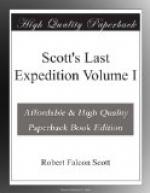A floe which we have just passed must have been a mile across—this argues lack of swell and from that one might judge the open water to be very far. We made progress in a fairly good direction this morning, but the outlook is bad again—the ice seems to be closing. Again patience, we must go on steadily working through.
5.30.—We passed two immense bergs in the afternoon watch, the first of an irregular tabular form. The stratified surface had clearly faulted. I suggest that an uneven bottom to such a berg giving unequal buoyancy to parts causes this faulting. The second berg was domed, having a twin peak. These bergs are still a puzzle. I rather cling to my original idea that they become domed when stranded and isolated.
These two bergs had left long tracks of open water in the pack. We came through these making nearly 3 knots, but, alas! only in a direction which carried us a little east of south. It was difficult to get from one tract to another, but the tracts themselves were quite clear of ice. I noticed with rather a sinking that the floes on either side of us were assuming gigantic areas; one or two could not have been less than 2 or 3 miles across. It seemed to point to very distant open water.
But an observation which gave greater satisfaction was a steady reduction in the thickness of the floes. At first they were still much pressed up and screwed. One saw lines and heaps of pressure dotted over the surface of the larger floes, but it was evident from the upturned slopes that the floes had been thin when these disturbances took place.
At about 4.30 we came to a group of six or seven low tabular bergs some 15 or 20 feet in height. It was such as these that we saw in King Edward’s Land, and they might very well come from that region. Three of these were beautifully uniform, with flat tops and straight perpendicular sides, and others had overhanging cornices, and some sloped towards the edges.
No more open water was reported on the other side of the bergs, and one wondered what would come next. The conditions have proved a pleasing surprise. There are still large floes on either side of us, but they are not much hummocked; there are pools of water on their surface, and the lanes between are filled with light brash and only an occasional heavy floe. The difference is wonderful. The heavy floes and gigantic pressure ice struck one most alarmingly—it seemed impossible that the ship could win her way through them, and led one to imagine all sorts of possibilities, such as remaining to be drifted north and freed later in the season, and the contrast now that the ice all around is little more than 2 or 3 feet thick is an immense relief. It seems like release from a horrid captivity. Evans has twice suggested stopping and waiting to-day, and on three occasions I have felt my own decision trembling in the balance. If this condition holds I need not say how glad we shall be that we doggedly pushed on in spite of the apparently hopeless outlook.




